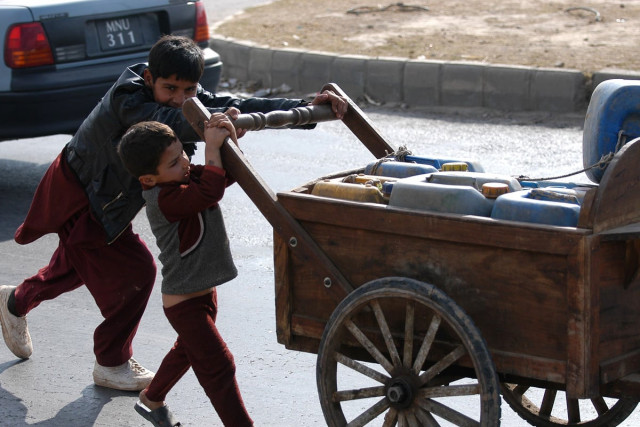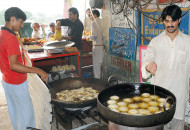Child labour runs rampant on capital streets
Little has been done to rehabilitate children working in deplorable conditions

The twin cities are home to thousands of skilled and unskilled workers who trek down from regions like Swat, North Waziristan and Peshawar in search of finding better employment opportunities. Many among them are children, who like their parents, must also contribute to the family income if they are to break bread at day end.
Left with little option, many of these youths find themselves on busy thoroughfares, often running from traffic signal to traffic signal; trying to sell anything ranging from garlands to sanitary products to moving cars.
One such child is eight-year-old Imran, whose family had moved to Islamabad several years ago, from their hometown of Bajaur, in the Malakand division of the Khyber-Pakhtunkhwa province.
“My father works as an auto mechanic, but his income is seldom enough to meet the most basic of our expenses. So everyone in my family, including me and my two siblings, have to pitch in to make ends meet,” said the boy sweeping his silken hair across his forehead.
“Baba drops me off at the Aabpara market every day before going to work. I must come home with some money by end of the day. If I don’t, my parents get really furious,” added Imran, who sells flowers and facemasks to marketgoers.
Although the federal capital has various government and non-government organisations functioning for children’s rights, so far little has been done to rehabilitate the many child labourers working in deplorable conditions, on the city’s busiest thoroughfares.
Young Imran makes some Rs300 a day, provided that he is able to sell a whole box of masks. However, money isn’t the only mode of payment. Some pay the eight-year-old in threats and scornful glances instead.
“It’s most Capital Development Authority (CDA) officials who try to rob me. It’s quite scary to ask them for money, but times when I do build up the courage they say that they’re going to put me in jail. So I rather make a loss, than end up in a prison cell,” he lamented.
If one was to ask an average eight-year-old for their greatest wish, things like the latest video game or a supercar may come up. However, for little Imran, his lifelong dream has been to leave behind his days of labour, play with his friends and go to school.
“It gets quite difficult surviving on the streets sometimes; under harsh weather, scary CDA officials and the looming threat of not being able to make enough money to take home. My heart longs for a normal life, like other kids,” told Imran.
A senior government official, when consulted to shed some light on the legalities around child labour, said on conditions of anonymity that laws exist but are seldom enforced. “Every time anyone is booked for enforcing child labour, the most time they serve in prison is six months and then go back to their old ways.
If we are to make any difference, the government should focus on drafting stricter penalties. We need to start taking pictures and preparing data on these people so that if they’re caught again they have no way of escaping the law,” he told The Express Tribune.
Published in The Express Tribune, February 25th, 2021.


















COMMENTS
Comments are moderated and generally will be posted if they are on-topic and not abusive.
For more information, please see our Comments FAQ